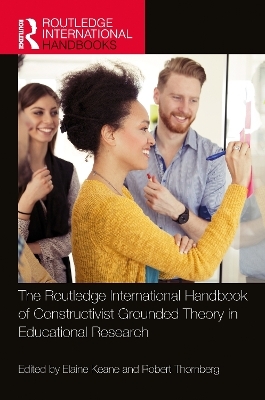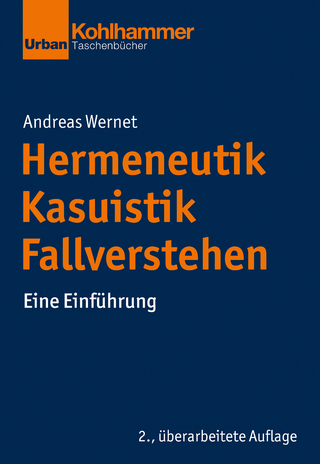
The Routledge International Handbook of Constructivist Grounded Theory in Educational Research
Routledge (Verlag)
978-1-032-54549-3 (ISBN)
The Routledge International Handbook of Constructivist Grounded Theory in Educational Research provides a comprehensive overview of the state of the art in Constructivist Grounded Theory (CGT) methodology, including core grounded theory tenets and processes as well as constructivist ‘adaptations’. It features CGT research from across the education sector, including studies based in primary schooling, post-primary (second-level) schooling, and higher education.
Across 5 parts and 20 chapters, the book makes explicit how CGT techniques and processes were implemented in the field, the way(s) in which challenges were navigated, and how educational researchers aligned their research processes to constructivist principles. It offers exemplars of good practice by educational researchers from Australia, Ireland, Italy, Norway, Sweden, Switzerland, the UK, and the USA. The Handbook synthesises learning from the experiences of CGT researchers in education to establish a framework of guidance for early career and more experienced researchers. Additionally, it directly interrogates and considers how to address challenges in the implementation of high-quality CGT and looks to the future of the methodology in educational research.
This Handbook provides guidance and education-specific examples to doctoral students and researchers who wish to use or are using CGT in educational research. It will also be of significant interest to qualitative researchers in other disciplines like sociology, psychology, and nursing.
Elaine Keane is Associate Professor and Head of the Discipline of Education in the School of Education at the University of Galway, Ireland. Her research focuses on social class and education, widening participation in higher education and the professions, teacher diversity, and Constructivist Grounded Theory (CGT) and she has published widely and led national and international projects in these areas. She is Co-Editor of Irish Educational Studies, serves on the editorial board of Teaching in Higher Education, and is convenor of the Educational Studies Association of Ireland (ESAI) Special Interest Group on Teacher Diversity Research. Robert Thornberg is Professor of Education at Linköping University, Sweden. He has been a member and the secretary of the Nordic Educational Research Association (NERA) and a member of the Educational Sciences Board at the Swedish Research Council. Robert is currently a Consulting Editor of Educational Psychology. His current research is on school bullying, especially with a focus on social and moral processes involved in bullying and bystander behaviours, including students’ perspectives, understanding, and experiences. Other research areas include social climate and relations in school, values education, and student teachers’ and medical students’ emotionally distressing educational situations.
Part 1: Introduction 1. Grounded Theory and Constructivist Grounded Theory: History and Development 2. Grounded Theory and Constructivist Grounded Theory in Educational Research Part 2: Constructivist Grounded Theory Studies with Children and Young People in Schools 3. A Constructivist Grounded Theory Approach to the School Experiences of Children Living at Refuges for Abused Women: Methodological Challenges and Possibilities 4. Using Constructivist Grounded Theory in a Study of the Career Aspirations of Children from Diverse Backgrounds in Ireland 5. “At this school, you can't do nuthin’!” Using Constructivist Grounded Theory to Understand the Failure of Zero-tolerance Discipline in Urban Education 6. Designing Interview Studies on School Bullying Using a Constructivist Grounded Theory Approach 7. Doing Constructivist Grounded Theory Research with Ethnographic Fieldwork to Understand Schoolchildren’s Involvement in School Bullying Part 3: Constructivist Grounded Theory Studies with Teachers and Parents 8. Whose Main Concern? Constructivist Grounded Theory as a Way of Gaining ‘Closeness’ to What is Important to Participants in a Study of Swedish School-age Educare 9. Employing Visual Methods in Constructivist Grounded Theory Research about Teacher Attrition in Primary Schools in England 10. Using Constructivist Grounded Theory to Understand the Experiences of Early Career Teachers Teaching Students with Diverse Learning Needs in Australia 11. Inside Out: Researcher Positionality as Insider and Outsider and Impact on the Co-construction of Data in a Constructivist Grounded Theory Study about Teachers’ Understandings of Intercultural Education in Ireland 12. Data Analysis in a Constructivist Grounded Theory Study of Remote Teachers in Australia Working with Students Impacted by Complex Childhood Trauma 13. Stepping into an Unfamiliar Field: An Account of Constructing a Grounded Theory in a Study with Parents in the United Kingdom about Home and Alternative Education Part 4: Constructivist Grounded Theory Studies in Higher Education 14. Tracing the Development of a Core Concept in a Constructivist Grounded Theory Study with Student Teachers from Working Class Backgrounds in Ireland: From ‘Performing Social Class’ to ‘Chameleoning to Fit in’ 15. Theoretical Pluralism and Theoretical Agnosticism as Useful Principles when Studying Student Teachers’ Efforts to Cope with Emotionally Challenging Situations 16. Navigating the Literature Review when Conducting a Constructivist Grounded Theory Study in of Internationalisation in Higher Education in Ireland 17. Developing a Theoretical Explanation of University Teaching Using Constructivist Grounded Theory 18. Keeping the Constructivism in a Constructivist Grounded Theory: Data Collection, Writing, and Publishing as Analytical Processes in a Study of Interprofessional Education and Collaboration Part 5: Good Practice, Interrogating Challenges, and Looking to the Future of Constructivist Grounded Theory in Educational Research 19. Synthesising Good Practice in Constructivist Grounded Theory Educational Research 20. Interrogating and Addressing Challenges and Looking to the Future of Constructivist Grounded Theory in Educational Research
| Erscheinungsdatum | 22.08.2024 |
|---|---|
| Reihe/Serie | Routledge International Handbooks |
| Zusatzinfo | 11 Tables, black and white; 24 Line drawings, black and white; 10 Halftones, black and white; 34 Illustrations, black and white |
| Verlagsort | London |
| Sprache | englisch |
| Maße | 156 x 234 mm |
| Gewicht | 952 g |
| Themenwelt | Sozialwissenschaften ► Pädagogik ► Allgemeines / Lexika |
| Sozialwissenschaften ► Pädagogik ► Bildungstheorie | |
| Sozialwissenschaften ► Soziologie | |
| ISBN-10 | 1-032-54549-6 / 1032545496 |
| ISBN-13 | 978-1-032-54549-3 / 9781032545493 |
| Zustand | Neuware |
| Informationen gemäß Produktsicherheitsverordnung (GPSR) | |
| Haben Sie eine Frage zum Produkt? |
aus dem Bereich


